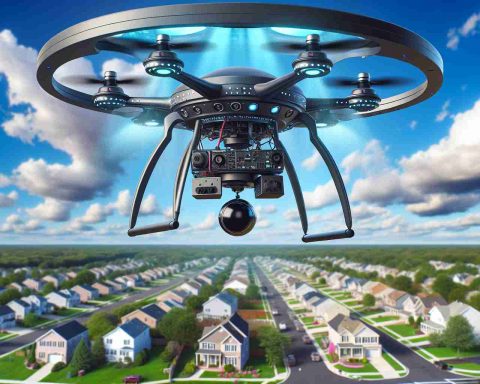In a significant move for the MENA region, Arabsat has forged a partnership with ZainTECH to deliver advanced digital solutions that promise to reshape connectivity. This collaboration brings together ZainTECH’s cloud infrastructure and Arabsat’s established satellite network to provide innovative services to businesses across the area.
By integrating these capabilities, the partnership aims to offer secure, reliable, and scalable solutions that incorporate cutting-edge technologies such as the Internet of Things (IoT), artificial intelligence (AI), and data services. Notably, this initiative will facilitate access to these tools even in remote and underserved locations.
This alliance exemplifies a commitment to accelerating digital transformation efforts across the region, enhancing connectivity and technological capabilities for various industries. Both companies believe that their combined expertise will foster a more interconnected future, ensuring that businesses can leverage modern technologies to remain competitive in an increasingly digital world.
Overall, the Arabsat and ZainTECH collaboration is poised to play a crucial role in driving innovation and addressing the evolving needs of the MENA market.
Transforming Connectivity in the MENA Region: A New Era of Digital Solutions
The partnership between Arabsat and ZainTECH heralds a transformative shift in the MENA region’s technological landscape. By merging advanced cloud infrastructure with robust satellite services, the alliance not only enhances connectivity for businesses but also suggests broader implications for society and the economy.
As digital tools become more accessible, the very fabric of society is likely to evolve. Enhanced connectivity can empower small and medium-sized enterprises (SMEs), unlocking new growth opportunities and fostering entrepreneurship. In regions traditionally sidelined by technological advancements, this partnership can bridge the digital divide, allowing for equitable access to information and services. This newfound availability is expected to stimulate local economies, leading to job creation and increased economic resilience.
Moreover, the confluence of technologies such as IoT and AI has the potential to revolutionize industries across sectors—from agriculture to healthcare. Smart solutions can lead to more efficient resource management, improved supply chains, and enhanced data-driven decision-making. This integration will not only improve operational efficiencies but also encourage a culture of innovation that could place the MENA region on the global technological map.
On the environmental front, the deployment of digital solutions can yield significant benefits. For example, improved data services can facilitate better monitoring of environmental changes, enable smart grid technologies, and promote sustainable practices in resource management. However, it’s crucial to consider the environmental footprint of expanding digital infrastructure. Future developments must focus on sustainable practices to ensure that the growth of technology does not come at an ecological cost.
As we look to the future, the collaboration between Arabsat and ZainTECH serves as a harbinger of broader trends expected to shape the global economy. The embrace of digital transformation can drive more robust economic frameworks, encouraging international investment and collaboration. Additionally, it sets a precedent for future partnerships within the region, inspiring other companies to explore innovative alliances that harness the potential of next-generation technologies.
In conclusion, the ArabSat-ZainTECH partnership is more than a business venture; it signifies a pivotal moment for the MENA region and beyond. It outlines a pathway towards a more connected, efficient, and sustainable future, reinforcing the critical role of technology in enhancing societal well-being and economic prosperity. The long-term significance of this collaboration will likely be felt across multiple layers of society, solidifying the foundation for a thriving digital economy in the years to come.
Revolutionizing Connectivity: Arabsat and ZainTECH’s Partnership Explained
The recent partnership between Arabsat and ZainTECH marks a pivotal shift in how digital connectivity will be approached in the Middle East and North Africa (MENA) region. As businesses increasingly rely on comprehensive digital solutions, understanding the implications and applications of this collaboration is essential for stakeholders involved.
FAQs About the Arabsat and ZainTECH Partnership
What specific services will be offered?
The partnership will provide a suite of services, including cloud computing, IoT solutions, AI-driven data analytics, and robust satellite communication services uniquely tailored for businesses operating in remote areas.
How does this impact remote locations?
By delivering advanced digital solutions to underserved regions, the alliance ensures that even businesses in the most remote parts of the MENA region can access modern technologies, thereby reducing the digital divide.
What industries will benefit the most?
Industries such as agriculture, healthcare, and logistics stand to gain significantly as they can utilize IoT and data services to optimize operations and improve service delivery.
Pros and Cons of the Partnership
Pros:
– Enhanced Connectivity: The integration of satellite and cloud technologies enables reliable and high-speed connectivity, crucial for businesses in remote areas.
– Scalability: This partnership allows businesses to scale their operations easily by leveraging cloud infrastructure without heavy upfront investments in hardware.
– Innovative Solutions: The combination of AI and IoT capabilities promises to foster innovation, empowering companies to make data-driven decisions.
Cons:
– Potential Overreliance on Technology: As businesses become dependent on digital solutions, there might be vulnerabilities related to cybersecurity and service outages.
– Implementation Challenges: Transitioning to advanced digital solutions may pose logistical challenges, especially for businesses unfamiliar with such technology.
Predictions for the Future of Digital Connectivity in MENA
As this partnership unfolds, we can anticipate a greater emphasis on digital infrastructure investments in the MENA region. The successful implementation of these technologies could encourage further collaborations among tech companies and telecom providers, leading to more robust businesses. Experts predict that by 2025, the digital economy in the MENA region is expected to grow exponentially, with satellite technology playing a key role in bridging gaps in connectivity.
Quick Tips for Businesses Considering Digital Transformation
1. Assess Needs: Evaluate your business needs and identify which digital solutions (cloud, IoT, AI) could optimize your operations.
2. Start Small: Implement digital solutions gradually. Begin with pilot projects to understand the technology before a full rollout.
3. Focus on Training: Ensure your team is trained to use new technologies effectively to maximize their potential.
4. Prioritize Security: As you adopt new technologies, implement robust cybersecurity measures to protect sensitive information.
In summary, the partnership between Arabsat and ZainTECH represents a forward-thinking approach to digital transformation in the MENA region, fostering connectivity and innovation that can significantly impact various sectors. As the industry evolves, remaining informed about these developments is crucial for businesses aiming to thrive in a technology-driven landscape. For more insights on the evolving digital landscape, visit Arabsat.




















